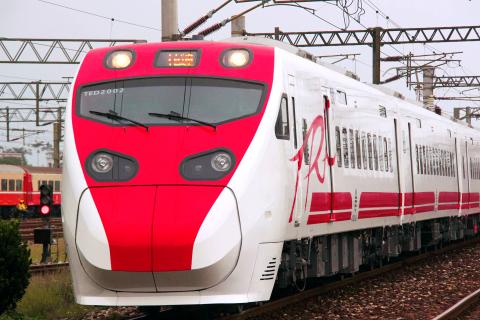The Puyuma Express train will be launched on Feb. 6, the Taiwan Railways Administration (TRA) said yesterday.
TRA transportation department chief Du Wei (杜微) said testing of the first set of the new tilting train was nearly complete.
He said the train would be used to transport passengers heading to the east coast for the Lunar New Year holiday, adding that the second set was still under testing.

Photo: Lin Hsin-han, Taipei Times
Each train consists of eight carriages, he said.
The first service is scheduled to depart from Shulin (樹林) Train Station at 9:40am on Feb. 6. The train will enable the TRA to add 56 trains during the nine-day holiday and provide an additional 2,000 seats daily.
Du said cabins No. 4 and No. 5 offer eight sets of table seats, with each accommodating four passengers. Two of the four passengers at the table seats would have to sit facing opposite the direction in which the train is heading.
Du said those wishing to buy tickets for the table seats must purchase four tickets at a time, adding that the TRA only accepts orders online or at station ticket counters.
“The seating arrangement in the cabins makes it easier for friends or family members to talk each other or play poker,” Du said. “Some people might feel uncomfortable if they sit next to or face a stranger the whole journey.”
However, Du said the TRA would accept orders from non-group travelers if there were still seats left in these two cabins within three days before departure.
Those heading to the east coast during the holiday can start booking tickets on Tuesday next week.
To ease congestion at peak hours, the TRA also announced it will offer four night express services on Feb. 7, Feb. 8, Feb. 15 and Feb. 16.
On Feb. 7 and Feb. 8, the night train will depart from Shulin at 11:28pm and arrive at Hualien at 2:35am.
The trains running on Feb. 15 and Feb. 16 will depart from Hualien at 11pm and arrive in Shulin at 1:50am.
Passengers taking the night trains will get a 30 percent discount, the TRA said.

Taiwan is stepping up plans to create self-sufficient supply chains for combat drones and increase foreign orders from the US to counter China’s numerical superiority, a defense official said on Saturday. Commenting on condition of anonymity, the official said the nation’s armed forces are in agreement with US Admiral Samuel Paparo’s assessment that Taiwan’s military must be prepared to turn the nation’s waters into a “hellscape” for the Chinese People’s Liberation Army (PLA). Paparo, the commander of the US Indo-Pacific Command, reiterated the concept during a Congressional hearing in Washington on Wednesday. He first coined the term in a security conference last

DEFENSE: The National Security Bureau promised to expand communication and intelligence cooperation with global partners and enhance its strategic analytical skills China has not only increased military exercises and “gray zone” tactics against Taiwan this year, but also continues to recruit military personnel for espionage, the National Security Bureau (NSB) said yesterday in a report to the Legislative Yuan. The bureau submitted the report ahead of NSB Director-General Tsai Ming-yen’s (蔡明彥) appearance before the Foreign and National Defense Committee today. Last year, the Chinese People’s Liberation Army (PLA) conducted “Joint Sword-2024A and B” military exercises targeting Taiwan and carried out 40 combat readiness patrols, the bureau said. In addition, Chinese military aircraft entered Taiwan’s airspace 3,070 times last year, up about

A magnitude 4.3 earthquake struck eastern Taiwan's Hualien County at 8:31am today, according to the Central Weather Administration (CWA). The epicenter of the temblor was located in Hualien County, about 70.3 kilometers south southwest of Hualien County Hall, at a depth of 23.2km, according to the administration. There were no immediate reports of damage resulting from the quake. The earthquake's intensity, which gauges the actual effect of a temblor, was highest in Taitung County, where it measured 3 on Taiwan's 7-tier intensity scale. The quake also measured an intensity of 2 in Hualien and Nantou counties, the CWA said.

The Overseas Community Affairs Council (OCAC) yesterday announced a fundraising campaign to support survivors of the magnitude 7.7 earthquake that struck Myanmar on March 28, with two prayer events scheduled in Taipei and Taichung later this week. “While initial rescue operations have concluded [in Myanmar], many survivors are now facing increasingly difficult living conditions,” OCAC Minister Hsu Chia-ching (徐佳青) told a news conference in Taipei. The fundraising campaign, which runs through May 31, is focused on supporting the reconstruction of damaged overseas compatriot schools, assisting students from Myanmar in Taiwan, and providing essential items, such as drinking water, food and medical supplies,